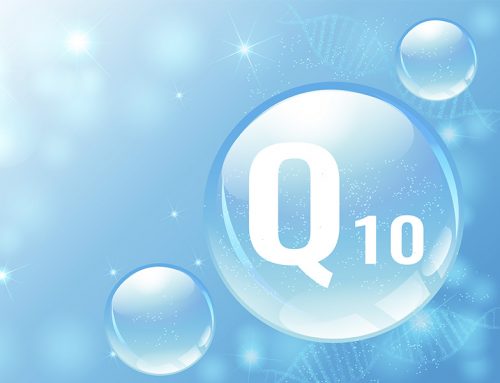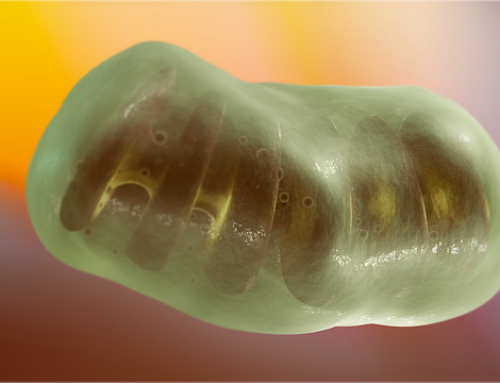
Given the importance of Coenzyme Q10 in the process of cellular energy production and in the process of neutralizing harmful free radicals, it is very important to take a daily Coenzyme Q10 supplement as we grow older.
Coenzyme Q10 is an essential bio-nutrient that is made naturally in the human body. It is a necessary co-factor in the process of cellular energy production. It also functions as a lipid-soluble antioxidant protecting our cells against oxidative damage (oxidative damage = damage caused by free radicals that harm cell membranes and cell DNA and proteins and fats in the blood).
Unfortunately, as we pass through our 20s and move into our 30s and 40s and head towards senior citizen status, our cells produce less of this essential substance with increasing age [Kalén]. We know this.
We know, moreover, that the taking of certain medications, statin medications prominently among them, will inhibit the body’s production of Coenzyme Q10 [Okuyama].
Low plasma Coenzyme Q10 status and degenerative diseases
Furthermore, low plasma Coenzyme Q10 concentrations have been associated with increased risk of cancer, chronic fatigue syndrome, diabetes, heart failure, HIV/AIDS, muscular dystrophies, Parkinson’s disease, and some genetic disorders [Mayo Clinic]. Indeed, low plasma Coenzyme Q10 status is regarded as an independent predictor of heart failure [Molyneux].
Coenzyme Q10’s role in healthy ageing
What do we need to slow down the ageing process? After all, we all want to die as young and healthy as possible as late in life as possible, isn’t that right?
We need energy. The amount of energy our cells can produce is limited by the availability of Coenzyme Q10. That is a simple fact.
How do we get more energy? Regular exercise is one possible answer. Taking a well-documented effective Coenzyme Q10 supplement is another answer. Diet alone is not going to be sufficient.
Coenzyme Q10 and the free radical theory of ageing
To slow down the ageing process, we also need protection against the harmful effects of a surplus of free radicals.
The free radical theory of ageing posits that an imbalance between unstable free radicals and neutralizing antioxidants leads to oxidative stress and damage. With the passage of time, continued oxidative stress can cause serious problems:
- dysfunction of the mitochondria (the energy factories) in the cells
- reduced energy production
- faster ageing and shorter lives

The mitochondria (singular: mitochondrion) are special organelles inside our cells that break down carbohydrates and fatty acids to produce energy in the form of ATP molecules. Coenzyme Q10 is essential to this process of cellular energy production.
Mitochondrial dysfunction and Coenzyme Q10
What is mitochondrial dysfunction exactly? Basically, mitochondrial dysfunction is the name for problems with cellular energy production.
The mitochondria themselves are those bean-shaped organelles inside the cells that are thought of as the power plants or the energy factories of the cells. Some cells, muscle cells for example, need many mitochondria; other cells like nerve cells do not need so many mitochondria.
The mitochondria are distinct from us humans; they have their own DNA, their own genome independent of the human genome. They do not divide like human cells. They actually pinch off to form a new mitochondrion.
The mitochondria and the human cells have somehow developed a mutually beneficial relationship. The mitochondria provide the energy and heat for the cells, and the cells provide a home for the mitochondria. Somehow it works. It is a great mystery how it came about.
Coenzyme Q10 needed for cellular energy production
The mitochondria take in nutrients and oxygen and break them down and produce adenosine triphosphate (ATP) molecules, which are the molecules containing the chemical energy needed for cellular metabolism. That is the reason the mitochondria are so important. And that process (called cellular respiration) needs Coenzyme Q10 molecules in the form of ubiquinone to function.
Treating healthy elderly adults with Coenzyme Q10 and selenium
Professor Urban Alehagen and his colleagues at Linköping University studied 443 healthy elderly adults in the four-year randomized, double-blinded, placebo-controlled KiSel-10 study. The study participants were aged 70 – 88 years and were still capable of living at home [Alehagen].
Professor Alehagen knew that the elderly study participants would, for the most part, have low Coenzyme Q10 and low selenium status and, consequently, lower cellular energy production and less antioxidant protection against harmful free radicals. His team of researchers randomly assigned the study participants to an active treatment group receiving 200 milligrams (100 milligrams twice daily) of Coenzyme Q10 and 200 micrograms of organic SelenoPrecise® high-selenium yeast or to a control group received matching placebo preparations. Each participant was treated for a period of four years [Alehagen].
The researchers continued to follow the study participants even after the conclusion of the active part of the study. Ten years after the commencement of their treatment, the participants in the Coenzyme Q10 and selenium active treatment group continued to show beneficial health effects.
- significantly reduced risk of death from heart disease
- better maintained heart function
- improved quality of life
- less need for hospitalization
Coenzyme Q10 status and loss of muscle mass and strength
Dr. Alexandra Fischer and a team of researchers investigated the role of Coenzyme Q10 in age-related loss of muscle mass and strength. They examined muscle strength, using measurements of hand grip force, in relation to age, gender, body mass index, and Coenzyme Q10 status. The age of the participants in the study showed a negative correlation with hand grip strength. Similarly, gender had a major influence on hand grip strength [Fischer].
The researchers found a significant positive relationship between the participants’ Coenzyme Q10/cholesterol ratios and hand grip force. The higher the Coenzyme Q10/cholesterol ratio was, the greater the hand grip force was. Lower Coenzyme Q10/cholesterol ratios seem to be a predictor of the loss of skeletal muscle mass and function [Fischer].
Conclusion: Coenzyme Q10 and ageing
If we want to age slowly and gracefully with less risk of degenerative disease, most of us need to be taking a Coenzyme Q10 supplement with documented health benefits.
Well-designed research studies have shown the following health benefits:
- Improved symptoms and survival for chronic heart failure patients [Mortensen]
- Reduced risk of death from heart disease [Alehagen]
- Reduced systolic and diastolic blood pressure in patients with high blood pressure [Rosenfeldt]
Coenzyme Q10 supplements with a good formulation are safe, effective, and affordable.
Given what we know about Coenzyme Q10, not taking a daily Coenzyme Q10 supplement is something of a gamble for middle-aged and older adults.
Read our key article about CoQ10 and cardiovascular health in elderly people
Sources
Alehagen, U., Aaseth, J., & Johansson, P. (2015). Reduced Cardiovascular Mortality 10 Years after Supplementation with Selenium and Coenzyme Q10 for Four Years: Follow-Up Results of a Prospective Randomized Double-Blind Placebo-Controlled Trial in Elderly Citizens. Plos One, 10(12), e0141641.
Bhagavan, H. N., & Chopra, R. K. (2006). Coenzyme Q10: absorption, tissue uptake, metabolism and pharmacokinetics. Free Radical Research, 40(5), 445-453.
Fischer, A., Onur, S., Niklowitz, P., Menke, T., Laudes, M., Rimbach, G., & Döring, F. (2016). Coenzyme Q10 Status as a Determinant of Muscular Strength in Two Independent Cohorts. Plos One, 11(12), e0167124. doi:10.1371/journal.pone.0167124.
Kalén, A., Appelkvist, E. L., & Dallner, G. (1989). Age-related changes in the lipid compositions of rat and human tissues. Lipids, 24(7), 579-584.
Mayo Clinic. (2013). Drugs and supplements: Coenzyme Q10. Patient Care and Health Information. Retrieved from http://www.mayoclinic.org/drugs-supplements/coenzyme-q10/background/hrb-20059019.
Molyneux, S. L., Florkowski, C. M., George, P. M., Pilbrow, A. P., Frampton, C. M., Lever, M., & Richards, A. M. (2008). Coenzyme Q10: an independent predictor of mortality in chronic heart failure. Journal of The American College Of Cardiology, 52(18), 1435-1441.
Mortensen SA, Rosenfeldt F, Kumar A, et al. The Effect of Coenzyme Q10 on Morbidity and Mortality in Chronic Heart Failure: Results From Q-Symbio: A Randomized Double-Blind Trial. JACC. Heart Failure. 2014;():. doi:10.1016/j.jchf.2014.06.008.
Okuyama, H., Langsjoen, P. H., Hamazaki, T., Ogushi, Y., Hama, R., Kobayashi, T., & Uchino, H. (2015). Statins stimulate atherosclerosis and heart failure: pharmacological mechanisms. Expert Review of Clinical Pharmacology, 8(2), 189-199.
Rosenfeldt, F.L. (20070. Coenzyme Q10 in the treatment of hypertension: a meta-analysis of the clinical trials. Journal of Human Hypertension, 21: 297-306.
Disclaimer: The information presented in this article is not intended as medical advice and should not be construed as such.









Leave A Comment